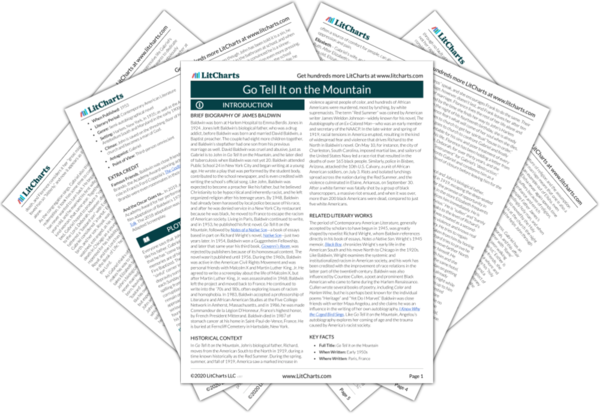Elizabeth’s Father Quotes in Go Tell It on the Mountain
No, she did not accuse him; but she accused her aunt, and this from the moment she understood that her aunt had loved her mother, but did not love him. This could only mean that her aunt could not love her, either, and nothing in her life with her aunt ever proved Elizabeth wrong. It was true that her aunt was always talking of how much she loved her sister’s daughter, and what great sacrifices she had made on her account, and what great care she took to see to it that Elizabeth should grow up a good, Christian girl. But Elizabeth was not for a moment fooled, and did not, for as long as she lived with her, fail to despise her aunt. She sensed that what her aunt spoke of as love was something else—a bribe, a threat, an indecent will to power. She knew that the kind of imprisonment that love might impose was also, mysteriously, a freedom for the soul and spirit, was water in the dry place, and had nothing to do with the prisons, churches, laws, rewards, and punishments, that so positively cluttered the landscape of her aunt’s mind.

Elizabeth’s Father Quotes in Go Tell It on the Mountain
No, she did not accuse him; but she accused her aunt, and this from the moment she understood that her aunt had loved her mother, but did not love him. This could only mean that her aunt could not love her, either, and nothing in her life with her aunt ever proved Elizabeth wrong. It was true that her aunt was always talking of how much she loved her sister’s daughter, and what great sacrifices she had made on her account, and what great care she took to see to it that Elizabeth should grow up a good, Christian girl. But Elizabeth was not for a moment fooled, and did not, for as long as she lived with her, fail to despise her aunt. She sensed that what her aunt spoke of as love was something else—a bribe, a threat, an indecent will to power. She knew that the kind of imprisonment that love might impose was also, mysteriously, a freedom for the soul and spirit, was water in the dry place, and had nothing to do with the prisons, churches, laws, rewards, and punishments, that so positively cluttered the landscape of her aunt’s mind.









